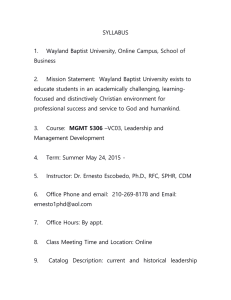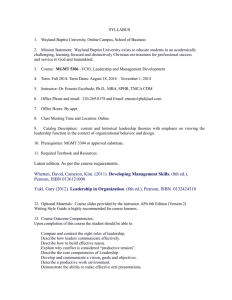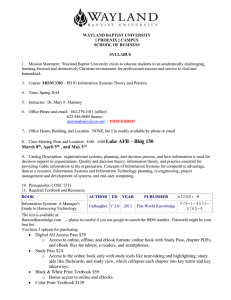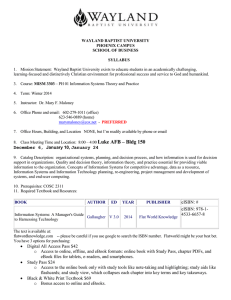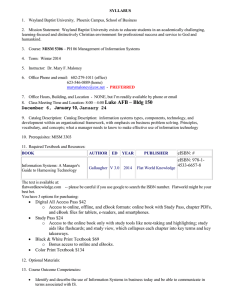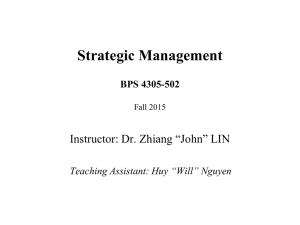SYLLABUS Baptist University, Fairbanks Campus, School of Education 2.
advertisement
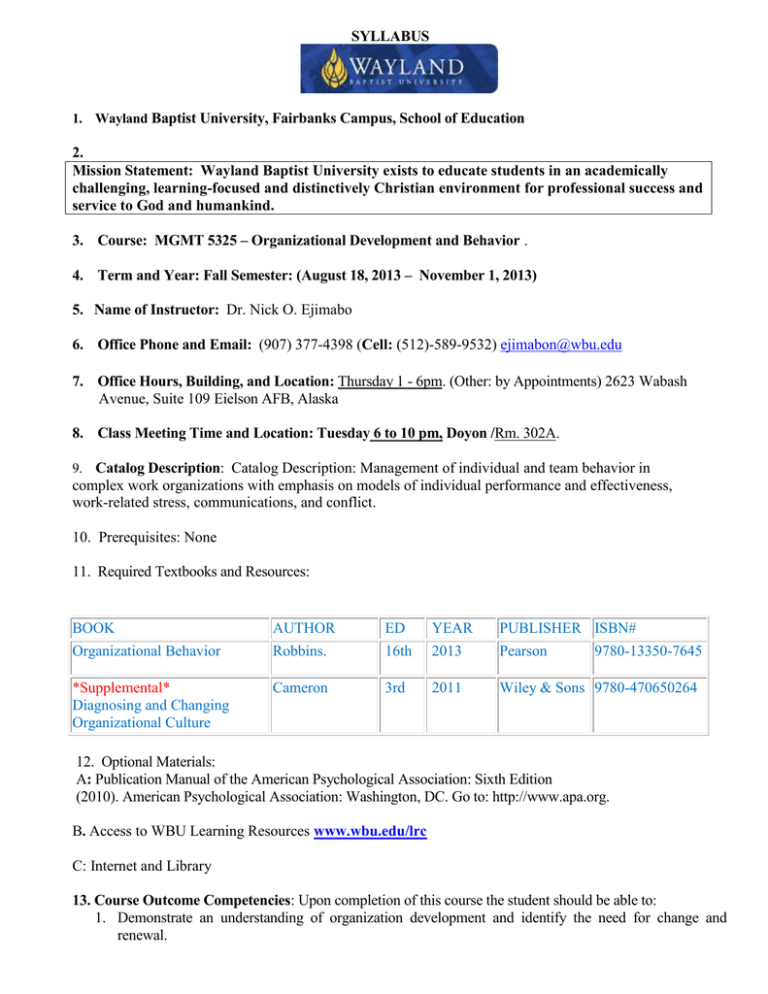
SYLLABUS 1. Wayland Baptist University, Fairbanks Campus, School of Education 2. Mission Statement: Wayland Baptist University exists to educate students in an academically challenging, learning-focused and distinctively Christian environment for professional success and service to God and humankind. 3. Course: MGMT 5325 – Organizational Development and Behavior . 4. Term and Year: Fall Semester: (August 18, 2013 – November 1, 2013) 5. Name of Instructor: Dr. Nick O. Ejimabo 6. Office Phone and Email: (907) 377-4398 (Cell: (512)-589-9532) ejimabon@wbu.edu 7. Office Hours, Building, and Location: Thursday 1 - 6pm. (Other: by Appointments) 2623 Wabash Avenue, Suite 109 Eielson AFB, Alaska 8. Class Meeting Time and Location: Tuesday 6 to 10 pm, Doyon /Rm. 302A. 9. Catalog Description: Catalog Description: Management of individual and team behavior in complex work organizations with emphasis on models of individual performance and effectiveness, work-related stress, communications, and conflict. 10. Prerequisites: None 11. Required Textbooks and Resources: BOOK AUTHOR ED YEAR PUBLISHER ISBN# Organizational Behavior Robbins. 16th 2013 Pearson *Supplemental* Diagnosing and Changing Organizational Culture Cameron 3rd 2011 Wiley & Sons 9780-470650264 9780-13350-7645 12. Optional Materials: A: Publication Manual of the American Psychological Association: Sixth Edition (2010). American Psychological Association: Washington, DC. Go to: http://www.apa.org. B. Access to WBU Learning Resources www.wbu.edu/lrc C: Internet and Library 13. Course Outcome Competencies: Upon completion of this course the student should be able to: 1. Demonstrate an understanding of organization development and identify the need for change and renewal. 2. Analyze organization culture and hypothesize on the behavior of individuals in an organization. 3. Analyze the factors contributing to an accelerating rate of change, and make recommendations to enable individuals and groups to cope with change. 4. Role-play an OD consultant. 5. Research system parameters and recognize symptoms, problems, and causes to change programs, and recommend strategies that can increase motivation to change. 6. Identify the range of 3 major OD intervention techniques and how they may be applied. 7. Compare team problems and why teams may not be operating at optimum capacity. 8. Contrast organization transformation (OT) in relation to the change process. 14. Attendance Requirements: As stated in the Wayland Catalog, students enrolled at one of the University’s external campuses should make every effort to attend all class meetings. All absences must be explained to the instructor, who will then determine whether the omitted work may be made up. When a student reaches that number of absences considered by the instructor to be excessive, the instructor will so advise the student and file an unsatisfactory progress report with the campus executive director. Any student who misses 25 percent or more of the regularly scheduled class meetings will receive a grade of F in the course. Additional attendance policies for each course, as defined by the instructor in the course syllabus, are considered a part of the University’s attendance policy. Additional Attendance requirement: Excessive late arrivals or early departures will be taken into consideration. Material will be discussed in class and included in the exams that are not in the book. It is the student’s responsibility to obtain any material missed by not attending class for any reason. The student must not miss any more than 25% of the class. Any more misses may result in failure of the class. In case of TDY’s the instructor should be notified as soon as possible. 15. Disability Statement: “In compliance with the Americans with Disabilities Act of 1990 (ADA), it is the policy of Wayland Baptist University that no otherwise qualified person with a disability be excluded from participation in, be denied the benefits of, or be subject to discrimination under any educational program or activity in the university. The Coordinator of Counseling Services serves as the coordinator of students with a disability and should be contacted concerning accommodation requests at (806) 291- 3765. Documentation of a disability must accompany any request for accommodations.” 16: Course Requirements and Grading Criteria: Assignments and Points a. Reflection paper: Students will prepare reflective summaries and create a collection of materials to utilize in future endeavors in education. The will be four reflective papers in this semester (TBD). Each student will be assigned /select a special topic from the subject matter of our course. The reflection paper will be discussed in the class. Total value = 200 points. b. Team Project Paper/presentation: A minimum 12- 15 page (content pages, excluding cover sheet, abstract and references) on a subject directly related to Organizational Development and Behavior will be the focus of the project. The team /group project and requirements will be discussed in the class, and would enable students demonstrate a growing proficiency in Management development and organizational leadership. Topics must be listed on sign-up sheet and initialed by instructor. Proper APA format is required. Total point value of 200 points. c. Examination: One examination/test will be given during the term. Questions will be mostly multiple choices along with some essay questions. Format and areas of study will be discussed and reviewed in the class before each exam. Total point value of 200 points d. Case Study Activities: Case Study (applying leadership qualities, types, ISLLC standards, theories, ethical behavior and other aspects related to the course material). Format and areas of study will be discussed and reviewed in the class before each case study activity. Total point value of 150 points e. Individual Term Paper: Each Student will complete one research paper for this class. The paper should be a minimum of ten pages of content, excluding coversheet, abstract and references, and should utilize at least ten references, five of them scholarly. Students will orally present a summary of this paper to the class. Papers must utilize APA format. Topics for papers must also be pre-approved by the professor. To avoid a 10-point deduction from your final grade in the course, completed paper must be available by the ninth class meeting to submit online to Safe Assignment. Total point value of 200 points f. Attendance Class Discussion and Participation You are expected to attend, participate and respond to the discussions and questions in every class. It involves answering of questions, personal experience, and suggestion on what you think about the class discussions and topics. Class participation is a grade activity that reflects preparedness for class as well as attendance. Arrive on time with assigned reading and papers completed on the prearranged deadline. Total point value of 150 points. Grading Scale: A = 90 - 100% B = 80 - 89% C = 70 - 79% D = 60 - 69% F = below 60% I = For Incomplete W = For Withdrawal Note: Students are required to demonstrate proficiency in the requirements covered in this Syllabus and in class. Students who are underperforming or who believe they need additional help are to inform the instructor or dean immediately. 17. Tentative Schedule: (Calendar, Topics, Assignments) This course outline serves merely as the anticipated roadmap I hope to use during this 11 weeks program. However, due to circumstances and the dynamic nature of this course, there may be some changes in the schedule. During such situations, you will be advised and changes will be discussed and noted accordingly. The dates and weeks listed below are the dates by which the course materials are expected to have been read. Week Dates Topic/Activities/Discussions Readings/Assignments 1 8/19 Ch. 1. Robbins’s Textbook 2 8/26 3 9/2 Introductions / Course Overview / Lecture Organizational Behavior An Introduction to Changing Organizational Culture (Team Project Group Formation) Diversity in Organization Attitude & Job Satisfaction Emotion & Moods (Case Study #2 Assigned) (Research Topic Selection) Personality & Values Perception & individual Decision Making Motivational Concepts 4 9/9 The Organizational Culture Assessment Instrument The Competing Framework in Organization (Group project Online Discussion) Ch. 2-3. Cameron’s Textbook Read Green Bk. Ch. 4-6 Ch. 1. Cameron’s Textbook Reflection Pape#1 Assigned Ch. 2-4. Robbins’s Textbook Case Study # 1due; Ref. #1 paper due. Class Meeting Ch. 5-7. Robbins’s Textbook Reflection Pape#2 Assigned Case Study #2 due 5 9/16 Constructing an Organizational Culture Profile Using the Framework to Diagnose and Change Organizational Culture Individual Change as a Key to Culture change A Condensed Formula for Org. Culture Change Blackboard Discussions/Reflection/Team Summary Ch. 4-7. Cameron’s Textbook Case Study# 3 Activities (Group project Online Discussion) Field Work/Team Project 6 9/23 General Discussion on Organizational Behavior and Course Lecture/Seminar/Film/Guest Overview/Evaluation Speaker/Presentations • Individual project Paper due Individual Presentation 7 9/30 Ch. 8-10. Robbins’s Textbook Reflection 2 due 8 10/7 Motivation: From Concepts to Applications Foundations of Group Behavior Understanding Work Teams (Article /Journal Online Discussions) Communication in Organization Leadership; Power & Politics (Theorists & Written Report) 9 10/14 Ch. 14-16 Robbins’s Textbook Research Papers Due / In-class Presentations 10 10/21 Conflict and Negotiation Foundations of Organization Structure Organizational Culture Review of final exam. Human Resources Policies & Practices Org. Change & Stress management 11 10/28 Summary and Conclusion / Final Test In-class Presentations Course Evaluations Research Papers Due Final Exam & end of Semester Ch. 11-13 Robbins’s Textbook Movie/film/Guest speaker Case Study Activities Ch. 17-18 Robbins’s Textbook 18. Additional information as desired by the faculty member. Student Responsibilities: Students are responsible for reading, understanding, and obeying all academic policies appearing in the Wayland Baptist University Academic Catalog applicable to their curriculum and/or program of study. Changes in the Syllabus: Although this course is expected to follow the syllabus as written, the instructor reserves the right to adjust the syllabus. The instructor will inform the students of all major changes in a reasonable and timely manner. Division of Business Goals: The division of business is committed to producing graduates who have the knowledge and skills to excel in business in its various sub disciplines. We are also committed to instruction in the business disciplines that is invested with the values of Christianity. Plagiarism Policy: Intellectual integrity and truthfulness are fundamental to scholarship. Scholars, whether they are performing as students or as teachers, are engaged in a search for truth. Plagiarism is a form of cheating and also a form of theft. Plagiarism occurs when a student fails to give proper credit when information is either quoted or paraphrased. Carelessness is no excuse. As such, it is a breach of scholarly responsibility. It is also unethical and in some cases, illegal. Looking at or copying someone else’s test, answer sheet, and/or paper are counted as cheating. Plagiarism will result in an “F” in the course. 19. Note: All assignments will have due dates and late penalties. Failure to submit assignments on time will result in the reduction of your grade by 10 points per 24-hour period following the due date. 20. ADDITIONAL COURSE REQUIREMENTS: Readings: Assigned readings are to be completed prior to the class session for which they are assigned. CLASSROOM COURTESY: Exhibit courtesy to everyone in your class by being on time and staying for the entire class time. Turn cell phones off and do not use them during class. Use cell phone outside of the classroom during breaks. Limit your discussions to course content. 21. Format of Course Deliverables: All course assignments must be submitted in the class. All course deliverables must be constructed in Times New Roman, 12pt font, double space, and submitted in APA and Microsoft word.
